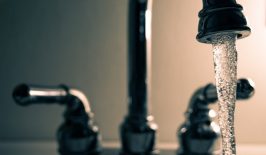We are a thirsty bunch. The global consumption of bottled water reached 230 billion litres in 2010 and goes up by about 10 percent per year. We take a look at why breaking the bottle habit is key to sustainable development.
Some Reasons to Avoid the Bottled Water Habit
- In many cases bottled water isn’t as healthy as suggested. Dr. V.H. Potty advises that unregulated impurities inside the bottled water may not be the only reason to worry, explaining that the dangers of chemicals such as metal may be leached from the plastic container over a period of time or in particular temperatures.
- There are still people without access to clean drinking water. The global bottled water industry’s revenue in 2010 was estimated at over $100 billion worldwide. That is $100 billion a year going into private infrastructure to create single serve plastic bottles while an estimated three billion people do not have tap water in their homes. The United Nations estimates that if given just 1/6th of that money for one year, $15 billion, they could halve the number of people without access to clean water.
- Buying bottled water is expensive. A single bottle of water generally runs about one to two USD. Filtered tap water is essentially the same product and costs a fraction of the price.
- The massive consumption of bottled water has a negative impact on environment. Bottles used to package water take over 1,000 years to bio-degrade and if incinerated, they produce toxic fumes. In the US alone, landfills are overflowing with two million tonnes of discarded water bottles. Just producing the plastic bottles for bottled-water consumption worldwide uses 50 million barrels of oil every year, which does not include fossil fuel and emissions costs of greenhouse gases needed to transport the final product to market. It is estimated that around three litres of water is used to package one litre of bottled water. This contributes significantly to depleting groundwater levels and decreasing the downstream water supply.
An example: a one kilogram bottle of water
According to Treehugger, the manufacture and transport of a one kilogram bottle of Fiji [brand] water:
- consumed 26.88 kilograms of water (7.1 gallons);
- consumed 849 kilograms of fossil fuel; and
- emitted 562 grams of greenhouse gasses (1.2 pounds).
Treehugger also notes that 1.5 millions barrels of crude oil is used to make PET water bottles every year and 2.7 tonnes of plastic is used to bottle water (of which 86 percent ends up in the garbage or on the streets).
Water extraction for bottled water can cause groundwater shortages. Many water bottlers are given carte blanche to mine local groundwater supplies at the expense of local populations and ecosystems, leading to groundwater shortages in areas where the water is being extracted. In India, for example, water extraction by Coca-Cola for its Dasani brand of bottled water and other drinks, has caused water shortages in over 50 Indian villages.
Think Before You Drink
Imagine: every bottle of water you drink is about three-quarters water and one-quarter oil. This is the energy it takes to put that bottle of water in your hand.
In many places in India, bottled water is the only source of bacteria-free water. Still, there are possibilities to reduce your bottled-water consumption:
- If possible, drink water from the tap. In Indian cities, most of the piped water supply coming from water utilities is safe. For example in Bangalore it is absolutely safe to drink the water supplied by the BWSSB directly without any treatment. More information pn this is available from your local water supplier.
- Install solar water heaters. Households with solar water heaters usually have the safest water to drink. Suppliers can be found here.
- Improve your water quality. Use a water filter. Of all the water filters available, the safest and cheapest is TATA SWACH.
- Take your own water with you. Buy a stainless steel or BPA-free plastic reusable water bottle to refill it at your tap. Alternatively, you can get a Design SOLAR BOTTLE, a water-purifying drinking container to have clean drinking-water wherever you are.
Thanks to Vishwanath S. for his advice on this article.





